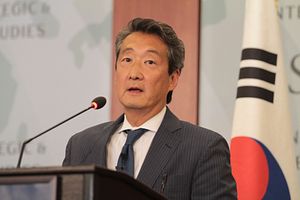Earlier this week, the Korea Herald reported that the Trump administration recently asked for Seoul’s approval of its nomination of Dr. Victor Cha to be the next U.S. ambassador to South Korea. The formal request for approval or “agrement” follows standard diplomatic protocol when one state prepares to dispatch their diplomatic representative to another. However, Seoul’s expected approval aside, the U.S. Senate must first confirm Cha’s appointment. His confirmation is expected to move forward in the near futur; the Herald’s Jung Min-kyung writes that Cha could arrive in Seoul in time for February’s Olympic Games.
Cha is a scholar-practitioner, moving back and forth between the academic and policy world. He received his Ph.D. in political science from Columbia University in 1994, and has spent most of his academic career as a professor at Georgetown University’s School of Foreign Service. He has written a number of books and academic journal articles focused on North Korea, U.S.-Asia relations, and Japan-South Korea relations within an asymmetric, U.S.-led alliance system. In 2004, he was appointed as director of Asian Affairs on the National Security Council under George W. Bush, and also later served as the deputy head of delegation for the United States at the Six Party Talks in Beijing. If his appointment is confirmed, Cha will leave his current positions at Georgetown and as senior advisor and Korea Chair at the Center for Strategic and International Studies.
The fact that the Trump administration is moving forward with the ambassadorial appointment is surely welcome news in Seoul and other regional capitals. Nevertheless, coming nearly a year into Trump’s term, it also highlights the administration’s lack of awareness of even the most basic foreign policy needs. The crisis surrounding North Korea’s nuclear and missile program arguably has been the most pressing issue the new administration has faced. Yet it has done so without the constant presence of the official representative of the president, the ambassador, in South Korea. Although Cha’s potential appointment was first reported in late August, it is only now moving forward.
According to one official source, the Trump administration’s erratic and dissonant signals toward not only Pyongyang, but also longtime U.S. ally South Korea, have left Seoul’s foreign policy establishment scrambling to make sense of things. The lack of a U.S. ambassador (or any sense of urgency in appointing a new one) has surely contributed to the sentiment.
The absence of an ambassador may also be situated within a larger trend; namely, the Trump administration’s apparent determination to gut the U.S. State Department (through budget cuts and by driving out large numbers of highly qualified career foreign service officers) as well as undo any and all Obama-era policies. Indeed, Mark Lippert, the previous ambassador to Seoul, in conjunction with every other politically appointed ambassador from the Obama years, was ordered to return home in late December 2016 by then President-elect Trump’s transition staff. The move broke with decades of precedent by declining to provide a grace period, something that might be important in the case of a valued ally facing a serious crisis-prone situation, with tens of thousands of U.S. military personnel present.
Unlike the president he is due to serve, Cha brings a wealth of demonstrated experience and historical knowledge to the job. However, similar to Trump, Cha prefers a more hawkish engagement toward Pyongyang, if underpinned by a more nuanced understanding of what is and is not possible. This includes both engagement and negotiation, but also a readiness to apply a more aggressive approach if Pyongyang breaks agreements. Still, Cha was recently on record stating: “no U.S. policy should be composed only of sanctions, military exercises, and diplomatic isolation.” How this position will accord with his role as Trump’s representative is an open question.
Cha’s earlier experience within the Bush administration may also be of value insofar as he served during a period of friction between Seoul and Washington D.C. At the time, a conservative Bush administration, acting unilaterally and aggressively abroad, had trouble dealing with a progressive South Korean president in Roh Moo-hyun. Roh was intent on carving out a more independent position vis-à-vis the United States and within the region. There are similarities today regarding the real and potentially growing cleavages between Trump and President Moon Jae-in (who was one of Roh’s closest advisers).
Yet the administration Cha is set to serve and the North Korea with which he has to deal are both different than those of earlier years. As a keen observer of events, Cha is certainly aware of this. However, his firm grasp of the issues and experience notwithstanding, Cha will be tasked with carrying out Trump’s instructions and explaining his impetuous (and erratic signals) to his South Korean hosts. Any hope that Cha might steer a more steady or independent course must be sorely tempered by Trump’s public and repeated undercutting of Secretary of State Rex Tillerson’s attempts to engage Pyongyang. Tillerson appears to have gotten the message with his apparent U-turn at the United Nations. Cha, no matter his skills and intelligence, will face the same constraints.

































